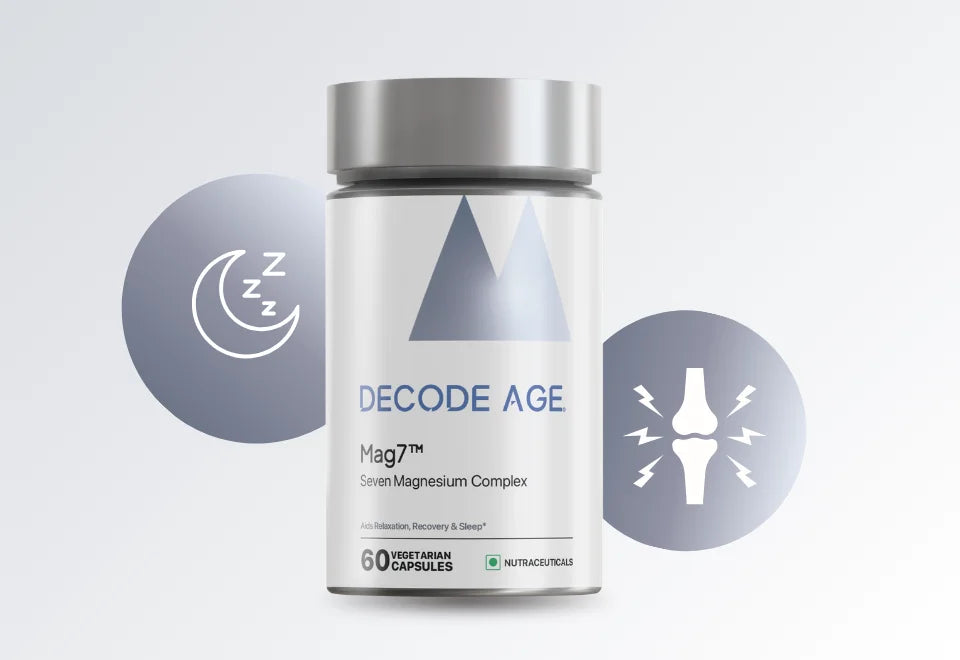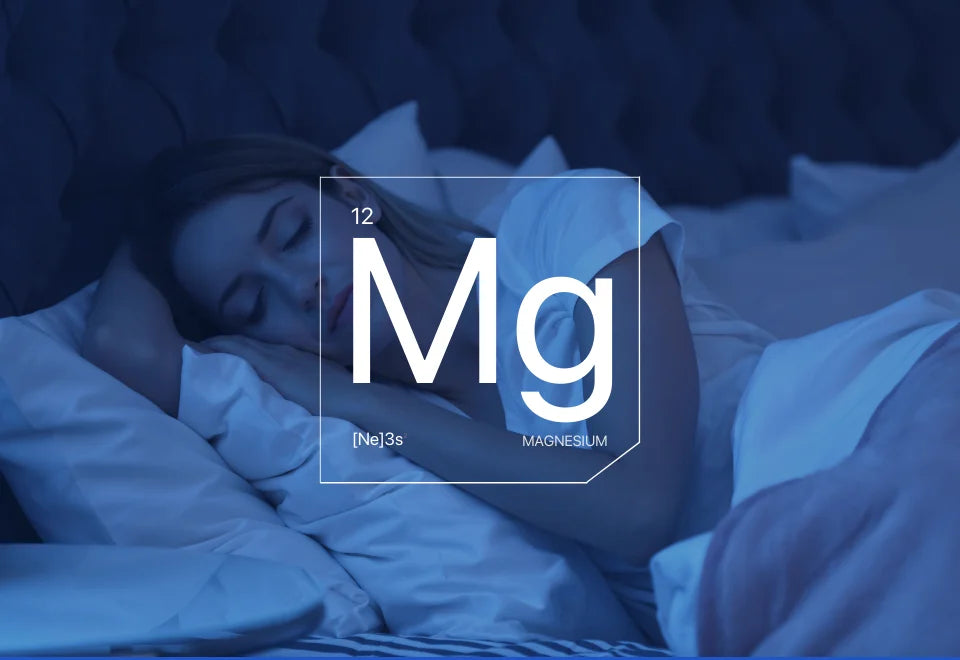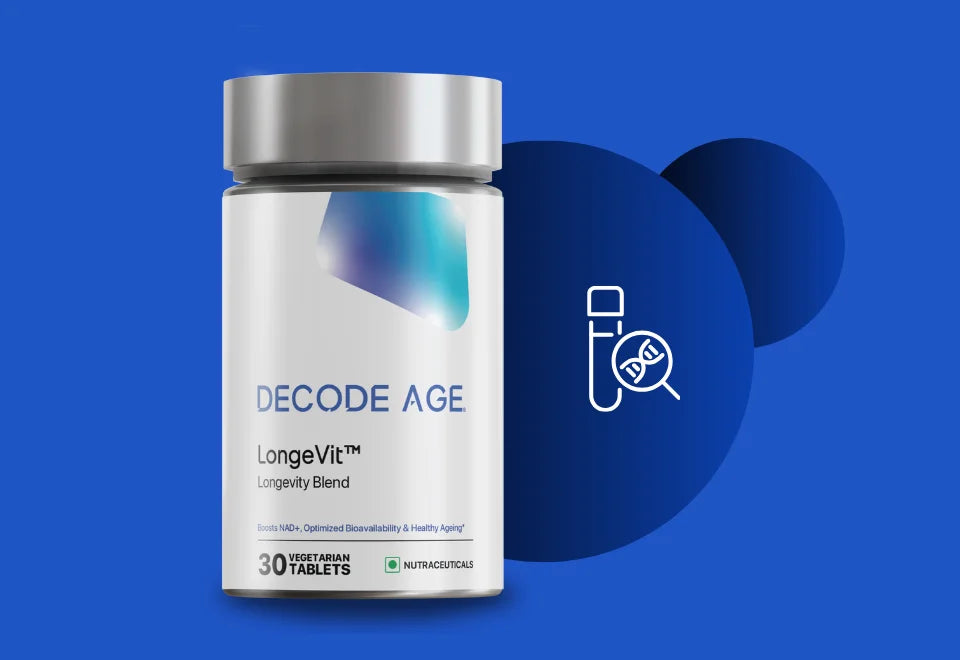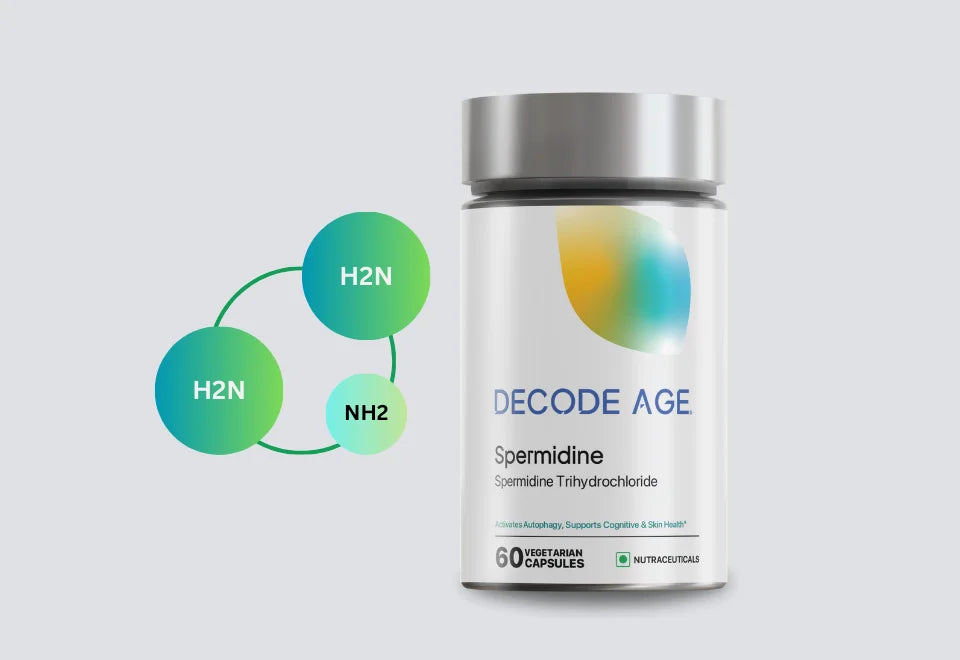Do you experience night-time leg cramps or abnormal heart rhythms? This could be due to magnesium deficiency. Magnesium is an essential mineral that is required for the proper functioning of the body. This mineral takes part in more than 300 different enzyme activities that help to modulate metabolic reactions in our body. Despite its significance, a lot of people lack enough magnesium, which can result in a number of health problems. This blog discusses the health benefits of magnesium, the advantages of taking magnesium supplementations and the benefits of magnesium complex like Decode Age Mag7 for general well-being.
What is magnesium?
Magnesium is a naturally occurring mineral found in several foods, such as green leafy vegetables, nuts, legumes, seeds, whole grains, dark chocolates, milk, yogurt, and various other milk-based products. It is the fourth most generous mineral in the human body and the second most abundant in cells, necessary for many cell functions and metabolic activities. About 60% of magnesium is stored in bones, 39% in tissues, and 1% in the blood (Volpe, 2013).
Health benefits of magnesium are vast and vital for many body functions like energy generation, bone growth, blood sugar control, blood pressure management, nerve function, and genetic material synthesis (Orlova et al., 2021). Despite the health benefits of magnesium, 48–60% of people do not meet their daily magnesium needs, which are 420 mg for men and 320 mg for women. Magnesium deficiency can disrupt many body functions causing muscle cramps, fatigue, weakness, irregular heartbeat, numbness and tingling in hands and legs, anxiety, and depression. Therefore, magnesium supplementations such as Decode Age Mag7, can help restore these functions and support overall health.
Health benefits of magnesium supplementation

Magnesium supplementation provides several benefits to health, particularly to those who do not get enough magnesium from their diet. Regular intake of magnesium supplements can help reduce symptoms related to magnesium deficiency. Below are some key benefits of magnesium supplementation:
Magnesium for sleep
Sleep problems can be disturbing and impact the health of an individual. Various studies have found that magnesium supplements benefit in improving sleep quality, especially in people with insomnia. Magnesium supplementation helps calm the nervous system by regulating neurotransmitters in the brain like GABA. This calming effect aids in relaxing and falling asleep resulting in deeper and more restful sleep (Mah & Pitre, 2021). Among the magnesium benefits for women, it has also been proven to reduce daytime sleepiness.
Magnesium for bone health
Magnesium plays a major role in bone formation and the regulation of calcium levels in the body. Magnesium supplements benefit women by increasing bone mineral density and reducing the risk of osteoporosis and fractures, particularly in postmenopausal women (Rondanelli et al., 2021). Similarly, magnesium benefits for men include promoting bone health by lowering the risk of fractures and increasing bone density.
Magnesium for heart health
Magnesium promotes heart health by keeping blood pressure in control and preserving regular heart rhythm. In men, magnesium supplementations are important for cardiovascular health and may reduce the risk of coronary heart disease (Mathers & Beckstrand, 2009). Beyond heart health, magnesium benefits for men include improved testosterone levels, muscle function, reduced cramps, and better recovery after physical activity.
 Conclusion
Conclusion
Magnesium supplementation has many health benefits, from improving sleep and muscle function to supporting heart and bone health. Whether you’re struggling with sleep issues, muscle cramps, or simply looking to improve your overall health, magnesium supplementation could be the missing piece in your health regimen. Considering options like Decode Age Mag7 which provides the magnesium complex benefits, can be an effective, well-rounded approach to meeting your magnesium needs.
FAQs
What are the symptoms of magnesium deficiency?
Magnesium deficiency, also called hypomagnesemia, occurs when there is a low level of magnesium in your body. The common symptoms of magnesium deficiency include a decrease in hunger, muscle cramps, fatigue and weakness, abnormal heart rhythm, abnormal eye movement, numbness in your hands and feet, and sleep disorders. Magnesium supplementation can help ease these symptoms
What are the causes of low magnesium levels in the body?
Many factors can cause low levels of magnesium in your body which include less intake of magnesium-rich foods like green leafy vegetables, nuts, seeds, and whole grains, digestive problems (celiac disease and chronic diarrhoea), conditions like diabetes and kidney diseases, and some medications (antibiotics, chemotherapy drugs, proton pump inhibitors, and diuretics). Dietary changes, treating underlying medical issues, and taking magnesium supplementations like Decode Age Mag7 can all help address these causes and maintain healthy magnesium levels.
What is magnesium complex?
The magnesium complex contains seven different types of magnesium in a single supplement. These are magnesium- citrate, oxide, bisglycinate, malate, orotate, amino acid chelate, and taurate. Benefits of magnesium complex include better cardiovascular health, increased muscle function, better relaxation and sleep quality, and general magnesium replenishment. One such magnesium complex supplement is Decode Age Mag7 which provides all your magnesium needs.
What are the benefits of taking magnesium at night?
Sleep disorders are nowadays very common in the young population. The benefits of taking magnesium supplements at night include relaxing your nervous system and calming your mind promoting better and deeper sleep and reducing night-time leg cramps. Magnesium increases the production of the hormone melatonin which is responsible for the sleep-wake cycle.
Can I take magnesium supplements daily?
Yes, you can take magnesium supplements daily. The recommended daily dose for magnesium is 420 mg for men and 320 mg for women. Changes in diet can help many people meet their magnesium needs; however, if your intake is insufficient or you have conditions that affect magnesium levels, magnesium supplements can be helpful. Before beginning a magnesium supplementation regimen, speak with your doctor.
What should not be taken with magnesium supplements?
Some medicines taken with magnesium supplements can affect the absorption and efficacy of magnesium. Calcium and zinc should not be taken with magnesium supplements as they may interfere with magnesium absorption.




























Leave a comment
All comments are moderated before being published.
This site is protected by hCaptcha and the hCaptcha Privacy Policy and Terms of Service apply.